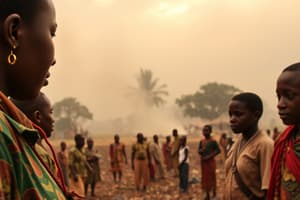Podcast
Questions and Answers
What was the main cause of decolonization?
What was the main cause of decolonization?
- Nationalist movements and pressures (correct)
- Western military intervention
- Religious conflicts
- Economic growth
What was one factor that led to the end of colonial rule?
What was one factor that led to the end of colonial rule?
- Enlightenment values (correct)
- Economic instability
- Lack of resources
- Military intervention
What was the main reason for decolonization?
What was the main reason for decolonization?
- Pressure from colonial governments
- Nationalist movements (correct)
- Fragile alliances between different groups
- Suppression of cultures
Which of the following ideas influenced nationalist movements during decolonization?
Which of the following ideas influenced nationalist movements during decolonization?
What was the main challenge faced by India's independence movement?
What was the main challenge faced by India's independence movement?
What characterized the alliances formed during nationalist movements?
What characterized the alliances formed during nationalist movements?
What was the main focus of South Africa's independence movement?
What was the main focus of South Africa's independence movement?
How did the ideology, political structure, and religion differ between nationalist movements?
How did the ideology, political structure, and religion differ between nationalist movements?
What happened in developing countries after decolonization?
What happened in developing countries after decolonization?
What was one way in which independence was achieved?
What was one way in which independence was achieved?
What were the main differences among independence movements?
What were the main differences among independence movements?
What was one result of exploding populations in developing countries after decolonization?
What was one result of exploding populations in developing countries after decolonization?
What was one effect of the end of empire?
What was one effect of the end of empire?
How did culturally diverse populations affect newly independent states?
How did culturally diverse populations affect newly independent states?
What factors contributed to military takeovers in newly independent states?
What factors contributed to military takeovers in newly independent states?
What did the globalization of democracy bring to many countries?
What did the globalization of democracy bring to many countries?
How did the separation of democracy and human rights from Western origins help the spread of democracy?
How did the separation of democracy and human rights from Western origins help the spread of democracy?
Flashcards are hidden until you start studying
Study Notes
- Decolonization occurred due to nationalist movements and pressures.
- Nationalist movements were influenced by Western democratic values and Enlightenment ideas.
- Movements were fragile alliances with varying classes, ethnic groups, religions, or regions.
- Ideology, political structure, and religion differed between movements.
- After decolonization, chaos ensued in developing countries.
- Exploding populations led to a lack of resources.
- Culturally diverse populations were not always loyal to the state.
- Economic disappointments, class resentments, and ethnic conflicts led to military takeovers.
- Globalization of democracy brought popular movements, multiparty elections, and new constitutions to many countries.
- Separation of democracy and human rights from Western origins helped the spread of democracy.
Studying That Suits You
Use AI to generate personalized quizzes and flashcards to suit your learning preferences.




